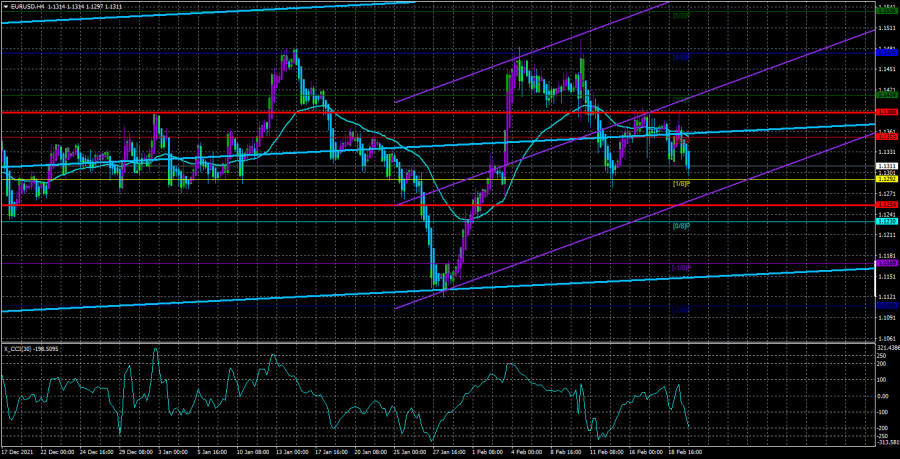
The EUR/USD currency pair continued to trade uneasily on Monday. To begin with, no important events were scheduled for Monday, either in the EU or in the USA. Thus, it is immediately required to explain why the pair went up 70 points at night and began a sharp decline in the afternoon? From our point of view, the answer is extremely simple: the market reacts to geopolitics, but not in the way that traders themselves would like. There is an opinion that if the geopolitical situation worsens, then the US dollar should grow. In principle, it is not completely devoid of logic. However, imagine that full-scale war will begin in Ukraine and it will last a year. Will the US currency rise in price for a year based only on the "Ukraine factor"? Unlikely. Rather, this judgment is fair, but at the same time, it is not worth waiting for too strong growth of the US currency just because of this factor alone. But the markets may start to panic. For example, the Russian stock market continues to fall. The Russian ruble resumed its downward rally against the dollar. And there are "swings" in the foreign exchange market. Moreover, until the very last trading day, the euro/dollar pair was not trading in the "swing" mode, but the movements shown on Monday suggest that now the euro/dollar pair will "fly" from side to side.
Mondays are different. Often, they are flat and boring, as there is no news, no reports. Sometimes they are trending, especially if there is a trend in general at this time. However, when the pair first goes 75 points up, then the same amount down, and all this without the support of the fundamental and macroeconomic background and with a day off in the United States (President's Day), this indicates the anxiety of traders.
Putin and Biden meeting. Is there any hope?
The meeting will take place within the framework of the European Security Summit on February 24. Let's try to analyze together the possible solutions that can be taken. Spoiler: there are no such solutions. Consider the position of Moscow. It wants guarantees not of NATO's expansion to the East, guarantees of Ukraine's non-entry into NATO. Ukraine wants to be able to join NATO in the near future, to return to Crimea and Donbas. The United States is not directly involved in the conflict, but at the same time supports Kyiv, as well as almost all EU countries, regularly supplying weapons and financial assistance. For the de-escalation of the conflict to begin, it is required that at least one side give up its position. There is every reason to assume that Moscow will not depart from its intentions. It was hardly worth driving 150,000 fighters and equipment to the Ukrainian borders to "rescue" at the most crucial moment of negotiations. Washington has nothing to lose at all. He takes only the position of "big brother" for Ukraine, fully supporting its desire to be independent and sovereign, and will gladly impose new sanctions against his opponent on the world chessboard. The EU countries understand that Ukraine is the last border between Russia and them. Therefore, if Ukraine becomes part of the Russian Federation, it will automatically mean the expansion of Moscow's sphere of influence to the West of Europe.
So far, in all this "vaudeville", Ukraine's retreat from its positions is seen as the most likely. However, it is precisely Kyiv that will not participate in the Euro-security summit, at which Biden and Putin are to meet. It turns out to be a rather strange situation in general when the situation in Ukraine will be resolved without the participation of Ukraine. From the point of view of common sense, this situation is absurd. But such are the realities in 2022. If no decision is made on February 24, there is a 99% probability that the conflict in Ukraine will continue to escalate. First of all, this is bad for the Russian and Ukrainian economies, for the exchange rates of their monetary units, their stock markets, and those flows of investments from abroad that happen from time to time. From our point of view, it is necessary to prepare for the worst.

The volatility of the euro/dollar currency pair as of February 21 is 67 points and is characterized as "average". Thus, we expect the pair to move today between the levels of 1.1254 and 1.1388. The upward reversal of the Heiken Ashi indicator signals a round of upward correction.
Nearest support levels:
S1 – 1.1292
S2 – 1.1230
S3 – 1.1169
Nearest resistance levels:
R1 – 1.1353
R2 – 1.1414
R3 – 1.1475
Trading recommendations:
The EUR/USD pair is trading below the moving average line. Thus, it is now possible to stay in short positions with targets of 1.1292 and 1.1254 until the Heiken Ashi indicator turns up. Long positions should be opened no earlier than fixing the price above the moving average with targets of 1.1388 and 1.1414. In both cases, it should be taken into account that there is a possibility of a flat.
Explanations to the illustrations:
Linear regression channels - help determine the current trend. If both are directed in the same direction, then the trend is strong now.
Moving average line (settings 20.0, smoothed) - determines the short-term trend and the direction in which trading should be conducted now.
Murray levels - target levels for movements and corrections.
Volatility levels (red lines) - the likely price channel in which the pair will spend the next day, based on current volatility indicators.
CCI indicator - its entry into the oversold area (below -250) or into the overbought area (above +250) means that a trend reversal in the opposite direction is approaching.

























